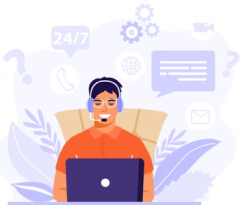Chatbots are changing the way we interact with technology. In the healthcare industry, they offer an exciting and affordable way to provide patients with information about their conditions, treatment options, and more. But how effective are these bots? And what can people expect from them in the future?
In this article, you can read through the pros and cons of healthcare chatbots to provide a balanced perspective on how they can be used in practice today.
What Are Healthcare Chatbots?
Healthcare chatbots are conversational software programs designed to communicate with patients or other related audiences on behalf of healthcare service providers. They’re designed to improve how people interact with their doctor’s office and make healthcare more accessible.
There are several ways that a healthcare chatbot can help improve the patient experience. The technology may be used to schedule appointments, order prescriptions, and review medical records. Chatbots can also provide helpful information about particular conditions or symptoms.
Chatbots are also becoming more common in hospitals, where they answer basic questions about medications and treatment options. And some hospitals have even begun using them to provide emotional support for patients struggling after a traumatic event or illness diagnosis.
What Are the Advantages Of Healthcare Chatbots?
Chatbots have become increasingly popular because they can provide a convenient way for patients to get answers to their questions while they’re at work or on the go.
Here are some of the advantages of chatbots:
1. More Efficient Patient Self-Service
Patients can use the bot to schedule appointments, order prescriptions, and refill medications. The bot also provides information on symptoms, treatments, and other important health tips.
These chatbots can do the following for patients:
- Help patients find the information they need to manage their health and stay healthy;
- Enable them to schedule appointments, refill prescriptions, and more;
- Enable them to get a second opinion on their diagnosis or treatment plan, if needed;
- Answer questions about insurance coverage, deductibles, and co-pays, as well as billing and payment options for services received at the hospital or clinic.
The chatbot can be used at any time of the day or night from any location. This makes it easier for patients to manage their health and schedule appointments.
Patients are often busy with work or family commitments so they have little time to visit their doctors. A chatbot provides a convenient way for them to access medical advice 24/7, 365 days a year without having to leave their homes or offices.
Healthcare chatbots offer more efficient patient self-service than traditional methods such as telephone call centers or websites. It’s where users must navigate multiple pages before reaching a live agent who may need to learn more about the specific issue before helping them.
2. Better Patient Engagement
There are several reasons why healthcare chatbots offer better patient engagement than traditional forms of communication with physicians or other healthcare professionals.
There are many different types of patients:
- Those who are old or young;
- Those who may have hearing or vision problems;
- Those who speak English as a second language or those who do not speak English at all.
- Those who come from other countries.
For these people, communicating with their doctor can be difficult if they need help understanding what they need to know about their health condition or treatment options. Artificial intelligence allows doctors to communicate with patients in any language they choose, even if they do not speak English well or at all.
3. Improved Efficiency
Another advantage of healthcare chatbots is their improved efficiency. The ability to have your questions answered instantly by a chatbot makes it easier for people to find answers and get back to what they were doing.
It can be frustrating when you have to wait on hold or go through multiple menus before getting help. With a chatbot:
- You can ask your question or request assistance, and you’ll receive an answer in seconds. This will save time and resources for both your organization and its customers;
- Chatbots also make it easier to provide information at the right time — when someone needs it most.
A patient may ask about a certain symptom or treatment option during their appointment, so being able to forward them directly the information they need saves both parties time and hassle.
4. Ability to Scale More Easily
Imagine a world where you can walk up to any healthcare provider, whether at home, in the hospital, or at your local pharmacy, and get immediate access to their expertise. This is the promise of healthcare chatbots, which are beginning to transform how patients interact with their doctors.
One way to achieve this is through the use of FHIR (Fast Healthcare Interoperability Resources) servers. FHIR servers provide a standardized way to store and retrieve healthcare data, making it easy for chatbots to access and use patient information, regardless of where the patient has received care.
One of the advantages of healthcare chatbots is their ability to scale more efficiently than humans. Doctors spend most of their time seeing patients in person or on the phone, but these interactions are limited by geography and availability.
By contrast, chatbots allow anyone with an Internet connection to ask for help from anywhere at any time. As long as there’s someone available to respond, there’s no limit on how many people can use the service at once.
This scalability also makes it easier for doctors to manage patient demand without increasing costs. They don’t need to pay salaries or benefits for human employees, and they can keep prices low while still offering excellent customer service.
That’s something that might not be possible if they were using traditional methods like telephone triage lines or online forums instead of modern technology.
5. Fast and Personal Interactions With Fewer Errors
Chatbots can help reduce errors because they can remember what happened in past conversations — so if you ask about allergies one day, then ask where the nearest pharmacy is the next day, you’ll get an answer without having to repeat yourself over and over again.
This can be especially helpful when dealing with sensitive topics like mental health or sexual health issues.
6. Provide Real-Time Assistance
One of the advantages of healthcare chatbots is they provide real-time assistance. If you have ever used an app for customer service, you know there are often long wait times. In fact, many people get frustrated and hang up before their call is answered.
There are several reasons for this, but one of the main ones is that the person answering calls may not be available when you call. If they’re busy helping someone else, your call may be put on hold or simply ignored until they can get to it.
Healthcare chatbots can provide real-time assistance because artificial intelligence (AI) answers all your questions. The AI doesn’t need to study a topic before providing answers. Instead, it just needs to know how to use the information already stored in its memory banks.
7. Reduce Administrative Tasks for Hospitals
Healthcare chatbots have several advantages over other forms of automation. One of the most significant is that they reduce administrative tasks for management.
Healthcare chatbots can help the authority perform their duties more efficiently. This is because they can handle tedious tasks, such as:
- Reviewing insurance claims;
- Scheduling appointments;
- Checking on test results.
Because these tasks are repetitive, chatbots are excellent tools for automation by artificial intelligence systems such as healthcare chatbots.
In addition to freeing up administrators, healthcare chatbots can also save money. For example, when the authority reviews an insurance claim with a patient over the phone or through an online portal instead of in person, fewer resources are needed to handle the transaction.
8. Provide Appointment Reminders
Healthcare chatbots provide appointment reminders. Patients who are busy may forget their appointments and miss them. This can cause them to lose out on important treatments and medication, which could negatively impact their health.
Healthcare chatbots can be programmed to remind patients of upcoming appointments, making them more likely to attend. The ability of healthcare chatbots to provide appointment reminders is one of the reasons why many healthcare organizations are considering adopting them.
9. No More Hold Time
Chatbots are here to stay. They’re the new standard in customer service and offer many benefits over the traditional human-centric approach.
One of the most significant advantages of healthcare chatbots is they have no more hold time. Customers can ask their questions, receive answers, and get what they need without having to wait on hold.
It is important for urgent situations like an emergency room or urgent care clinic, where every second counts when it comes to saving lives.
10. No Scheduling is Needed
Many of the people who have used healthcare chatbots have found that one of the advantages is there’s no scheduling needed.
If you’ve ever tried to schedule an appointment with your doctor, you know how frustrating it can be. You call the office, and they tell you they can’t fit you in for another two weeks. That’s even if you’re able to talk to someone on the phone.
However, with a healthcare chatbot, you need to ask when is a good time for them to meet with you, and they’ll suggest a time right then and there.
You don’t even need to wait until that time comes around either because the bot will remind you beforehand so that you don’t forget about it.
This means that if you want to get in for an appointment as soon as possible, you can get it without any hassle.
What Are The Disadvantages Of Healthcare Chatbots?
Chatbots have become popular in delivering healthcare services, but the technology isn’t perfect. They’re a great way to help patients and customers connect with their healthcare providers. However, there are some disadvantages of chatbots in healthcare as well, and here are some of them:
1. No Real Human Interaction
Healthcare chatbots are a great way to provide information, but they need to offer real human interaction. This can be a disadvantage if you’re dealing with an emergency situation or need help understanding the instructions given by your healthcare provider.
Some people may feel uncomfortable talking to an automated system, especially when it comes to sensitive health matters. Some people might not find them as trustworthy as a real person who can provide personalized advice and answer questions in real time.
When it comes to healthcare, the value of human interaction is clear. It is better than using healthcare chatbots because of the following reasons:
- It can connect you with a real person who can help you make decisions about your care;
- It allows the patient to take an active role in their own treatment;
- It gives doctors more opportunities to assess patient behavior and symptoms.
If you’re trying to get help with something minor, like an upset stomach or the flu, then a chatbot might work just fine. But if you’ve got something serious like cancer or heart disease, you may want to talk to a real person instead. In this case, a chatbot can help you to connect with the person through Live Chat.
Basically, it’s not a problem if you choose an AI-powered conversational chatbot like REVE Chatbot.
2. Limited Information
The reason for this is that healthcare chatbots are designed to be simple and easy to use. This means that one of the disadvantages of healthcare chatbots is that they offer limited information. They can only offer a small amount of data at any given time since they want to make sure users get enough information.
This means that if you have a complex medical issue or are looking for an in-depth answer, you might get frustrated with your chatbot. And if you’re just looking to find out what symptoms you should be looking out for, it may not be worth your time to use one of these programs at all.
3. Security Concerns
The security concerns for healthcare chatbots aren’t new and have been well-documented in other sectors, like banking, finance, and insurance. Undoubtedly, it is one of the biggest disadvantages of chatbots in healthcare. They are still at an early stage of development, and there are many security concerns that need to be addressed before they can be used more widely.
Security is a major issue for all businesses and consumers alike. The recent Facebook or Cambridge Analytica scandal has shown people how important it is to protect our data and personal information from being misused by third parties. This has become even more important as people see more use of AI systems and smart devices in our day-to-day lives.
A study by the University of California San Diego researchers found that over half of the bots they tested were vulnerable to attack due to poor coding practices (Reddy et al., 2018). The researchers found that some bots were vulnerable because they didn’t use encryption when processing sensitive data such as health records or payment details.
4. Inaccurate Data
Chatbots can provide inaccurate data to their users. This is because their information may need to be more accurate and up-to-date, which could result in misdiagnosis or treatment failure.
However, there are ways to overcome this disadvantage. For example, healthcare chatbots can be programmed to only answer questions pre-approved by doctors and other medical professionals to avoid giving out misleading information.
According to a Journal of Medical Internet Research study, only 42% of information on websites for health-related topics is accurate. This is due to the need for the following:
- More resources,
- Time,
- Efforts to research and update content regularly.
Moreover, there’s always a risk of misinformation when using chatbots as they aren’t programmed with real human emotion or empathy.
5. Reliance on Big Data and AI
The healthcare industry is one of the most data-driven industries in the world. The amount of information that can be shared, collected, and analyzed has grown exponentially over the past decade. This has led to an influx of data-based research, including machine learning and artificial intelligence.
However, this also means that many companies rely on big data and AI to provide their services. They use it as a means to gather personal information about their customers and patients to improve their services.
One of the disadvantages of healthcare chatbots is that they depend on big data and AI to operate. This could mean that several companies have access to your personal information if you use a healthcare chatbot service.
Additionally, since big data and AI require large amounts of computing power in order to work efficiently, they can be expensive for small businesses or startups who still need access to this type of technology or can’t afford it right now.
6. Chatbot Overload
One of the disadvantages of healthcare chatbots is that they can be overwhelming. With so many different options to choose from, it can be difficult for patients to find the right healthcare chatbot for their needs.
It’s important to remember that the purpose of a healthcare chatbot is not to replace human interaction with a doctor or other medical professional. Instead, they should serve as an additional resource for patients who may need help getting through the process of:
- Scheduling appointments;
- Finding doctors:
- Getting information about their health.
Chatbots are also excellent tools for patients who are uncomfortable with speaking with medical professionals because they can provide them with information without talking to anyone directly.
7. Lack of Trust
People who have experienced a negative experience with automated systems in the past are less likely to trust technology. This can cause them to be hesitant when they interact with a healthcare chatbot, especially if they have a personal or family history of mental health issues.
As more people interact with healthcare chatbots, more will begin to trust them. However, this change will not happen overnight.
Some medical conditions and mental health issues cannot be treated by chatbots but require a human touch. Chatbots are great for providing information but not for communicating with patients about their condition or treatment plan.
8. Misleading Medical Advice
Another disadvantage of chatbots in healthcare is they sometimes give out misleading medical advice. Because they’re programmed by humans, they’re prone to errors. Some of these errors can be very serious and dangerous, such as giving wrong medication instructions or suggesting that the patient developed a new condition that does not exist.
Chatbot technology is still in its infancy, and, as with most new technologies, there are bound to be some issues with it. The main problem is that there’s no way for the human user to know whether or not a chatbot is right or wrong. They may appear to be infallible because they never admit when they make mistakes, but they can still give out incorrect information without realizing it.
9. Less Access to Specialists
Chatbots are becoming increasingly popular in the healthcare industry. However, experts say that one of their disadvantages is the inability to access specialists.
According to a report from Deloitte, chatbots are used by more than 90% of large companies and 64% of small businesses in the UK. The report also noted that in the next five years, half of all consumers would shop using a chatbot.
The use of chatbots has become so widespread that even some doctors are using them as an alternative way to communicate with their patients.
However, only some are convinced that this is a good idea. One of the chatbots’ biggest issues is that they don’t have access to specialists when they need them most. This means that they’re unable to provide patients with the right care at critical times. There may also be some cases where they give out incorrect information or advice because they don’t have all the necessary information.
The best way to avoid this problem is to verify your source before using the chatbot’s information. You can also ask questions directly to your doctor or healthcare provider before making any important decisions based on what the chatbot has told you.
How to Overcome These Drawbacks With a Smart Chatbot?
There are several ways to overcome the limitations of a chatbot. Let’s take a look at the best possible ways to overcome these drawbacks.
- Regularly updating the chatbot’s knowledge base: The chatbot’s knowledge base should be regularly updated with accurate and relevant information to ensure that it can provide accurate and helpful responses to users.
- Incorporating machine learning and natural language processing: A chatbot can better understand user queries and provide more accurate responses using advanced technologies such as machine learning (ML) and natural language processing (NLP).
- Implementing data validation and verification: To ensure the accuracy of the data provided by the chatbot, data validation and verification processes can be put in place. This can include cross-referencing data with external sources and having a human review of specific responses before they are provided to users.
- Ensuring data security: To protect sensitive user data, chatbots should be designed with safety in mind and comply with relevant data protection laws and regulations. This can include implementing secure data storage, encryption, and access controls.
- Offering human assistance: When a user’s query is beyond the chatbot’s capabilities, the chatbot can offer to connect the user with a human representative for further assistance.
Conclusion
In the end, it’s important to remember that there are pros and cons to every technology. Chatbots may not be perfect, but they can provide many benefits for healthcare providers—especially when it comes to improving efficiency and making it easier for patients to access their records. As this technology continues to develop, people will see more and more people using chatbots as part of their daily lives.
Author bio:
Dmytro Sokhach is an entrepreneur and a 6-Figure Flipper Club member. Founded Admix Global (web agency) that builds websites, makes them profitable, and sells them as a business.






